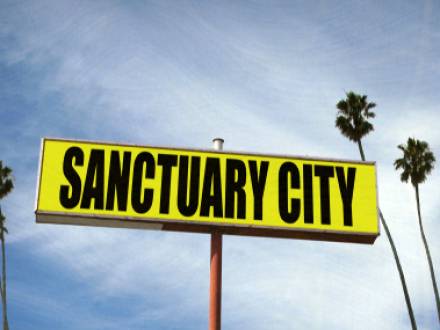Will Sanctuary Laws Actually Protect Undocumented Migrants?
 When the new administration takes place, there may be many changes to immigration laws currently in place, along with promised mass deportations. In the state of Illinois, such measures could impact about half a million undocumented immigrants in the state, including about 30,000 DACA recipients.
When the new administration takes place, there may be many changes to immigration laws currently in place, along with promised mass deportations. In the state of Illinois, such measures could impact about half a million undocumented immigrants in the state, including about 30,000 DACA recipients.
Because it has laws that prohibit local law enforcement from assisting ICE agents in the enforcement of immigration laws, Chicago is known as a sanctuary city. The state of Illinois has had a similar law in place since 2017. This law is known as the TRUST Act. Across the state, other townships and cities may also be designated as sanctuary cities.
While it is hoped that these sanctuary laws will help undocumented immigrants avoid deportation/removal over the coming years, federal law often supersedes state law, making the outcome unclear. Because of this, it can be extremely beneficial to speak to an Itasca, IL immigration attorney to determine your options.
What Are Sanctuary Cities?
The city of Chicago has been a sanctuary city for almost four decades. The mayor at the time, Mayor Harold Washington, issued an executive order that prohibited any city employer from assisting federal immigration officials or asking an individual about his or her immigration status. In 2006, the executive order became city law, which was expanded and codified in 2012.
The term "sanctuary city" has become an unofficial designation for any jurisdiction that discourages or prohibits local law enforcement from cooperating with ICE officials. The ways this can be accomplished vary. Local officials may refuse to collect or provide information regarding immigration status. The one exception to these sanctuary laws is when an undocumented immigrant has a federal criminal warrant.
While local sanctuary laws, like those in Chicago, would ensure that local law enforcement officials offered no assistance to ICE, it would not prohibit ICE from deporting undocumented immigrants in the city. ICE generally does ask for help from local law enforcement when seeking noncitizens for deportation, and a lack of cooperation will definitely hinder their efforts. The same is true of the Trust Act for the state.
Both laws prevent local police from asking about a person’s immigration status, cooperating with federal immigration agents, or detaining someone solely on their immigration status. Sanctuary laws also prevent local officials from assisting in ICE raids and transporting detained undocumented immigrants. Local law enforcement may also not share information regarding undocumented immigrants with ICE, including their addresses.
What Are the Goals of Sanctuary Cities?
Most sanctuary cities and states operate under the belief that undocumented immigrants bring much more to the table than they take. Undocumented immigrants are seen as neighbors, co-workers, and friends. In 2022, across the United States, 42 percent of all farm workers were undocumented immigrants. About a fifth of all construction workers lack legal status. It is estimated that in 2022, undocumented immigrants paid $96.7 billion in federal, state, and local taxes. Sanctuary cities and states exist for all these reasons and for basic human rights and dignity.
To What Extent Are Undocumented Immigrants Protected in a Sanctuary City or State?
The federal government is allowed to enforce immigration law anywhere in the nation – even if local authorities refuse to assist. City and state law enforcement agents cannot stop ICE agents from arresting noncitizens, provided the ICE agents have a properly executed warrant ordering the arrest and deportation of a specific person.
The incoming administration's proposed use of the U.S. military to assist with the mass deportation would normally violate federal law. However, the Insurrection Act of 1807 could be invoked to allow the military to assist in location and deportation.
Contact a DuPage County, IL Immigration Attorney
If you have questions regarding deportation issues or have any other immigration issues, an Itasca, IL immigration lawyer can help you make the best choices for your situation. When you choose Unzueta Law Group, P.C., you will benefit from a local family law firm with more than 20 years of experience in immigration law. Call 630-509-2363 today to schedule an initial appointment. Se Habla Espanol.



Contact Unzueta Law Group, P.C.
The use of the Internet or this form for communication with the firm or any individual member of the firm does not establish an attorney-client relationship. Confidential or time-sensitive information should not be sent through this form.
I have read and understand the Disclaimer and Privacy Policy.



